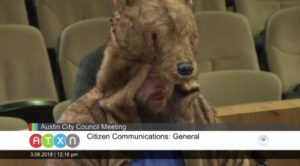Reporter’s Notebook: Grin and bear it
Monday, March 12, 2018 by
Austin Monitor Putting himself out there… Randy Clarke spent his second full day as the Capital Metropolitan Transportation Authority’s CEO personally apologizing to riders. Clarke and top agency brass posted up at the downtown rail station just before rush hour on Thursday to greet commuters before they boarded Red Line trains. The service has recently hit some construction-related turbulence resulting in a notable flurry of delays in recent weeks. Clarke mingled with passengers on the platform and on outbound trains just before departure to explain the nature of the construction projects causing the disruptions (in summary, federally mandated safety enhancements and new rail siding that will increase MetroRail’s capacity) and when things should get back on track, as it were (perhaps by the end of the year, perhaps even longer depending on how long the projects take). The effort also had the beneficial side effect of publicly raising Clarke’s profile, a need that was on display on Sunday at a mobility policy panel hosted by Capital Factory. During that discussion, a panelist from Moovel pointed to Capital Metro Chief Information Officer Joe Ianello in the audience and joked about pushing the agency to put up a viable light rail proposal. That drew chuckles from the crowd including from the fellow sitting right next to Iannello who later, during the Q&A portion, introduced himself to the panelists as Randy Clarke, new head of Capital Metro.
 Bear witness… Last month, Council Member Delia Garza poked fun at the idea of “protecting neighborhoods,” quipping that she believed the city’s role was to protect neighborhoods from “fires and bears,” not newcomers. The quote was an instant hit among Austin urbanists. Eric Goff, the leader of AURA, an urbanist advocacy group, showed up at Citizen Communication on Thursday in a full bear costume to extol the benefits of building more housing. “I hate to be the bearer of bad news,” he started. “But it seems that Austin’s plan to allow more families to have homes in Central Austin neighborhoods is as far away as Ursa Major.” Among the other zingers: “You can’t let opponents of new housing beary CodeNEXT”; “You need to stand up for more homes if you ever want the cost of living and traffic to be bearable in this city”; “Every neighbearhood in Central Austin needs a lot more homes”; and, “Let’s put the den back in ‘density.’” Mayor Steve Adler replied, “I love this city.”
Bear witness… Last month, Council Member Delia Garza poked fun at the idea of “protecting neighborhoods,” quipping that she believed the city’s role was to protect neighborhoods from “fires and bears,” not newcomers. The quote was an instant hit among Austin urbanists. Eric Goff, the leader of AURA, an urbanist advocacy group, showed up at Citizen Communication on Thursday in a full bear costume to extol the benefits of building more housing. “I hate to be the bearer of bad news,” he started. “But it seems that Austin’s plan to allow more families to have homes in Central Austin neighborhoods is as far away as Ursa Major.” Among the other zingers: “You can’t let opponents of new housing beary CodeNEXT”; “You need to stand up for more homes if you ever want the cost of living and traffic to be bearable in this city”; “Every neighbearhood in Central Austin needs a lot more homes”; and, “Let’s put the den back in ‘density.’” Mayor Steve Adler replied, “I love this city.”
Where isn’t it hot?… During a recent City Council discussion about redeveloping city-owned land, Council Member Jimmy Flannigan asked city staff how it had determined which sites had the most potential for redevelopment. A staffer replied that there are a number of factors, including whether the area real estate market in that area was “hot enough.” Flannigan later replied: “If there are parts of the community where the market isn’t hot, I think the community would like to know that.”
The view from the top… More proof that Austin’s days as a cheap landing spot for artists and musicians are over comes from a new study from the apartment search website RentCafe. The company’s research into gentrification found that the 78702 zip code in East Austin is the 13th most quickly gentrifying location in the U.S. RentCafe determined its list by comparing an area’s change in home value price with the growth in median household income. For 78702 those numbers worked out to a tripling of home prices (212 percent growth) compared to a 47 percent increase in income. Similar home value spikes relative to residents’ earning power is one of the factors that caused the city to create the Anti-Displacement Task Force last year, with the goal of preserving and expanding affordable housing, and preserving small businesses and community assets. Among Texas cities, Austin was joined on the list by Houston twice (Nos. 3 and 19) and Fort Worth (No. 6).
This week’s Reporter’s Notebook comes from the notebooks of Caleb Pritchard, Jack Craver and Chad Swiatecki.
The Austin Monitor’s work is made possible by donations from the community. Though our reporting covers donors from time to time, we are careful to keep business and editorial efforts separate while maintaining transparency. A complete list of donors is available here, and our code of ethics is explained here.
You're a community leader
And we’re honored you look to us for serious, in-depth news. You know a strong community needs local and dedicated watchdog reporting. We’re here for you and that won’t change. Now will you take the powerful next step and support our nonprofit news organization?









